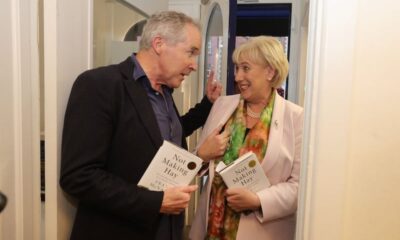Breaking News
Uyghur woman in Ireland details Chinese pressure and harassment
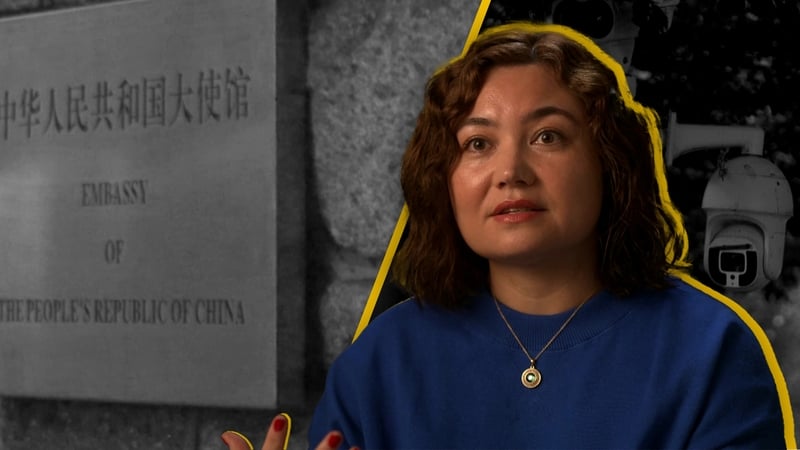
Read more on post.
Around 200 Uyghurs live in Ireland, part of a predominantly Muslim Turkic minority of some 12 million people, most of whom are in China’s Xinjiang region.
There, they face conditions described by the UN as constituting possible crimes against humanity.
Beijing has also been accused of targeting Uyghurs and other critics abroad — a campaign one woman says has followed her to Dublin through surveillance, harassment, and pressure on her family back home.
Over 50,000 people from China live, work and study in Ireland.
Many stay and obtain Irish citizenship, starting their own businesses and raising their families here in Ireland.
One such person is Nuria Zyden, a mother of two who moved to Ireland from China in 2009 and became an Irish citizen in 2013.
But Ms Zyden’s story isn’t typical; she hails from the city of Kashgar, in Xinjiang, and is a member of that region’s Uyghur minority. She is one of just 200 or so Uyghurs to live in Ireland.
Until 2014, Ms Zyden was able to stay connected with her loved ones back in Xinjiang through WeChat, a Chinese smartphone app that works much like WhatsApp but is closely monitored by the Chinese state.
WATCH: Nuria Zyden on her suspicions of being followed while travelling to Sarajevo
But as the repression in Xinjiang worsened, that changed.
“All my siblings, cousins, and friends blocked me on WeChat,” Ms Zyden recalled.
“Only my mother kept me on her contact list, but she asked me not to call her. I later learned that having a family member abroad is often perceived as an act of disloyalty to the Chinese Communist Party, a situation that has led many to detention,” she added.
Although her mother asked her not to call, she did not cut off the connection completely.
“Occasionally, she would post family photos, and I would share pictures of my children,” Ms Zyden said.
“It was our silent way of signaling that we were okay. Despite the distance and fear, she kept me in her contacts, perhaps so I could see these occasional posts.”
With many of her direct connections to Xinjiang severed, Ms Zyden decided to channel her energies into building what she described as “a safe and vibrant Uyghur community” in Ireland.
The Uyghur community in Ireland is small, but Ms Zyden founded the Irish-Uyghur Cultural Association, launching the organisation in January 2024 at an event that garnered national media coverage in The Irish Times.
The organisation has less then 10 members, and receives little funding, but Ms Zyden believes the launch was enough for China to take notice.
“Shortly after the launch, my mother’s WeChat account went silent. I tried every means to contact her — calling old friends in Beijing and using every connection I could think of — but no one could tell me what had happened,” Ms Zyden said.
“When I had nearly lost hope of reconnecting with my elderly mother, unsettling messages began to arrive. One claimed that my sister had said I needed to return to China to renew my citizenship. Despite living in Ireland and holding Irish citizenship, I am still considered Chinese by the Chinese Communist Party. Another message came from an unknown sender who shared a photo of my family home in Kashgar,” she added.
‘Followed’
Towards the end of October 2024, Nuria attended the World Uyghur Congress in Sarajevo in Bosnia and Herzegovina.
The World Uyghur Congress is a non-profit organisation that says it aims to “peacefully promote human rights, religious freedom, and democracy for the Uyghur people.”
It is considered a terrorist organisation by the Chinese government; affiliation with the organisation has led to Uyghurs being targeted by Chinese authorities at home and abroad.
Ms Zyden’s journey to Sarajevo included a stopover in Frankfurt in Germany.
As she boarded her first flight from Dublin, she says two Chinese men offered to help her with her bags. She politely declined.
After arriving in Frankfurt, she boarded her second flight, to Sarajevo, again seeing that the two Chinese men were on the flight, raising her suspicions that they may have been following her.
Her suspicions were all but confirmed upon arrival at her hotel in Sarajevo.
“At the hotel where the Congress was held, these same individuals were seen photographing Uyghur participants in the lobby,” Ms Zyden said.
“A fellow Uyghur pointed out that they seemed hostile towards me.”
Ms Zyden photographed the two men as they were confronted by participants of the congress in the hotel lobby. After her return from Sarajevo, things escalated further.
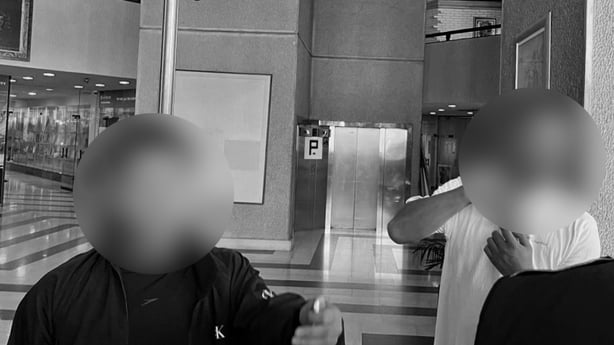
“When I returned to Dublin, I checked a spare phone with the WeChat app and found numerous missed calls from my mother and sisters,” she said.
“A new account claiming to be my sister’s requested to connect. I accepted, and during a call, my sister questioned me about attending the Congress, accusing me of not caring about the family’s safety. She also demanded that I add the new account, which she said was set up by local officials in Kashgar.”
Ms Zyden continues to communicate with her family through this new account, but she has no doubts that the exchanges are an attempt to intimidate her.
“My mother looks fearful and fatigued in our video calls, and she has hinted that I must speak with ‘officials’ who I fear could manipulate me,” Ms Zyden said.
“This situation has placed immense pressure on me, as I worry that not speaking with my family could put them in further danger and might lead to harsher punishment for them.”
What Ms Zyden describes tallies with stories from other Uyghurs living abroad, according to research published by Amnesty International in 2019 and by the Uyghur Human Rights Project in 2022.
One well-known Uyghur activist in the Netherlands told Amnesty that he was regularly followed and intimidated by people he believed to be Chinese.
Several told stories of WeChat messages and phone calls that featured close relatives in seeming distress, and of repeated requests to return to China or attend the local embassy.
“The Chinese government is notorious for globalising its censorship, for engaging in transnational repression, and the targets, foremost, are Chinese citizens who are abroad to study, to work, or what have you,” said Kenneth Roth, the former director of Human Rights Watch who himself was sanctioned by the Chinese government for challenging their abuses.
“If they see, say, a student who is abroad and too critical of Beijing, they will approach their parents in China. It’ll be an invitation for a friendly cup of tea, which in fact is a threat. If your child continues to criticise as a student in the West, there will be consequences for you, your family member here in China. That is something that terrifies Chinese students in the diaspora,” Mr Roth added.
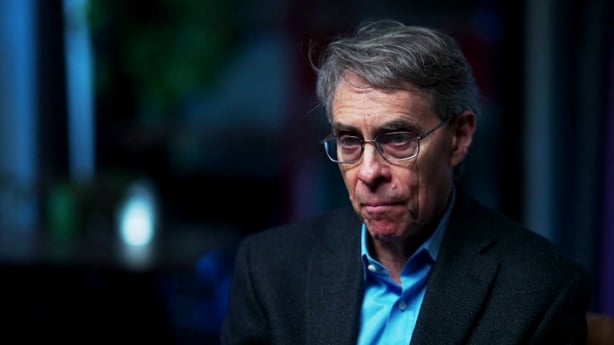
RTÉ Investigates asked the Chinese Embassy about China’s targeting of diaspora critics, including in Ireland. It did not address that specific question, but described allegations of abuses in Xinjiang as “lies and disinformation cooked up by anti-China forces.”
As a result of this surveillance and intimidation, Ms Zyden says she lives in constant fear. She reported the issues to the gardaí and to the Department of Justice, but she feels she has not received any support from the authorities.
The Department of Justice told RTÉ Investigates that it “does not comment on individual cases, or on the detail of security matters.”
It said: “Any attempt by a foreign government to exercise control or carry out extra-judicial activities, including the monitoring of individuals on Irish soil is a matter of serious concern and is dealt with as such by An Garda Síochána.”
Ms Zyden says she is worried that she is under constant surveillance, and that her children may be in danger. She has even become suspicious of other Irish-Uyghurs, fearful that she can no longer trust even those among her own community.
“As an Irish citizen, she is being harassed in Ireland in a way that is genuinely chilling,” said David O’Brien, who co-founded the Irish-Uyghur Cultural Alliance alongside Nuria and who spent many years living in Xinjiang.
“She can’t, of course, visit home. She can’t see her family. Her children have never met their grandmother, for example. But here in Ireland, because she had the temerity to set up an organisation that would give a different account of what was happening in the region, this has provoked the Chinese authorities to target her in a way that everybody in Ireland should be pretty shocked by.”
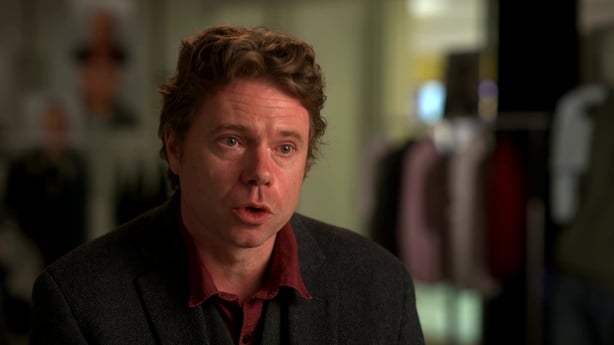
Mr O’Brien said he and Ms Zyden had contacted the Department of Justice, the Department of Foreign Affairs, and the Gardaí about the harrassment.
“While they will listen and they are sympathetic and they hear what she’s saying, they say there’s nothing they can do,” Mr O’Brien said.
“It’s either not their remit or the legislation is not there. Basically, the Irish government do not want to engage with this as an issue,” he added.
RTÉ Investigates also contacted the Department of Foreign Affairs and An Garda Síochána regarding Ms Zyden’s case but did not receive a response to our questions.
Ms Zyden’s story captures the lengths to which China will go to suppress discussion of Xinjiang and its Uyghur population, according to academics and experts that spoke to RTÉ Investigates.
But despite the allegations of crimes against humanity in Xinjiang, and the alleged targeting of Irish citizens on Irish soil, Ireland continues to maintain and build a strong relationship with China, a relationship that has been fostered by successive Irish governments.
Ireland is the only European Union member that maintains a trade surplus with China, and, though it is only the bloc’s 14th-largest economy, it is its fifth largest exporter to China. Several large Chinese companies have their global or European headquarters in Ireland, including social media company TikTok and online retailers Shein, and Temu.
China clearly sees Ireland as an important partner, and some of its most senior officials have visited the country in the past two years.
Chinese Premier Li Qiang, the second-highest ranking member of the state, made an official visit to Ireland and met with then Taoiseach Leo Varadkar and President Michael D. Higgins.
More recently, in February, China’s foreign minister Wang Yi made Ireland one of only three stops on his visit to Europe, meeting with both Taoiseach Micheál Martin and Tánaiste Simon Harris.
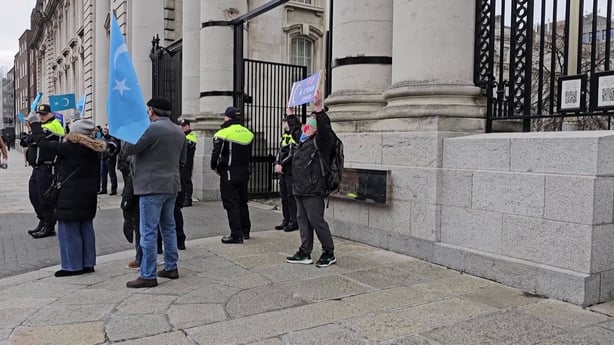
For Mr Wang’s visit, Uyghur protesters gathered outside the gates of the Department of the Taoiseach to greet his motorcade as it arrived, a small group of about 20 men and women protesting the Chinese state.
Despite what she describes as intimidation, she led the protest. As the protesters chanted in support of the thousands of imprisoned Uyghurs back in Xinjiang, two Chinese officials emerged from the gate to take photographs of the group.
For Ms Zyden, the visit was symptomatic of the Irish state’s response to her own plight.
“I was proud to come to Ireland and be made a citizen because it too suffered from colonialism and repression, but I have been so disappointed,” she said.
“Sometimes I think, would I have been better off moving somewhere else, to a country that was willing to help me?”
RTÉ Investigates: Forced Fashion is broadcast tonight, 24 September at 9:35 on RTÉ One and RTÉ Player. Documentary produced/directed by John Cunningham.
READ: Suppliers to major Irish retailers linked to forced labour cotton
READ: How forced Uyghur labour could be woven into your wardrobe
Breaking News
Crews attend ‘serious explosion’ at warehouse

Read more on post.
An industrial estate is being evacuated following a “serious” explosion.
Police, ambulance crews and firefighters were called to the Groundwell Industrial Estate on Crompton Road in Swindon at about 19:30 BST following an explosion in a warehouse.
Wiltshire Police described the incident as “serious” and said a large cordon is in place around the scene.
A force spokesperson said they are working to evacuate the immediate area, and that people living nearby should stay indoors and keep their windows closed for their own safety.
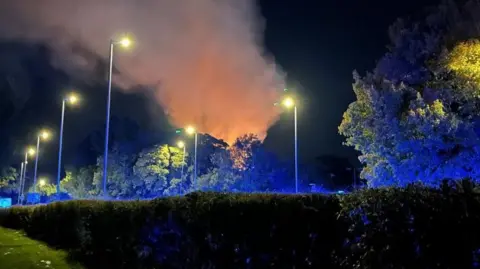
Dorset and Wiltshire Fire and Rescue Service said it was dealing with a large warehouse fire and currently has 10 fire engines at the scene, along with other specialist vehicles.
Dozens of residents have written on social media that they felt their homes shake following the explosion.
Breaking News
Justice minister ‘surprised’ Irish Prison Service paid ‘2 Johnnies’ €24,600 for podcast
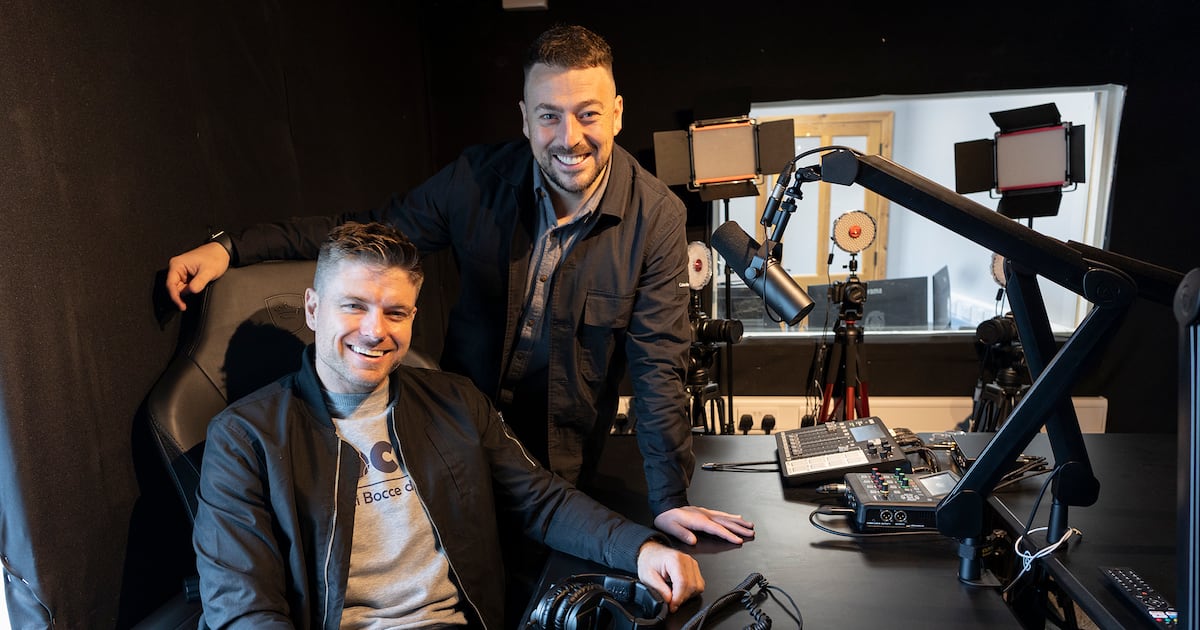
Read more on post .
Minister for Justice Jim O’Callaghan has said he was “surprised” that the Irish Prison Service paid almost €25,000 to The 2 Johnnies comedy duo for a podcast as part of a drive to recruit more prison officers.
The Minister said it was “a lot of money to spend on a podcast for recruitment” when he was asked about the payment after it emerged on Wednesday.
The IPS confirmed that a fee of €20,000, plus €4,600 in VAT, was agreed with the Tipperary entertainers for the show.
The sponsored hour-long podcast featured prison staff speaking about life working in an Irish jail and the advantages of a job in the penal system.
“I’m surprised that amount of money was spent. It doesn’t strike me as a necessary expenditure when you consider all the obligations that rest on the prison service,” said Mr O’Callaghan.
It has also emerged that the comedy act received no payment from An Garda Síochána for a similar podcast with two garda recruits.
Garda Commissioner Justin Kelly said the Garda “did the same podcast” last year, when Garda members were interviewed by The 2 Johnnies “and we didn’t pay anything for it”.
He added it was “really useful for us … it was a really good audience for us” at a time when the Garda was running its own recruitment campaign.
The Minister was asked about the payment while attending the annual conference of the Association of Garda Superintendents (AGS) in Trim, Co Meath.
He said he went to the National Ploughing Championships last week to launch the new Garda recruitment competition at no expense and that the commissioner does this promotion work for recruitment too.
Mr O’Callaghan said public money had “to be spent efficiently and carefully”.
Asked about recent public order incidents in Dublin, Mr O’Callaghan and Mr Kelly said a new plan to increase the number of gardaí on the streets would yield clear results before Christmas.
They both rejected the allegation Dublin is unsafe or is run by street gangs in places.
Reacting to the two serious stabbings that took place in Dublin over the weekend, including a gang attack that left a 17-year-old with up to 20 wounds, Mr O’Callaghan said Dublin was “a large international capital city”.
“We are going to get some criminal activity in a city of that size. I am also aware attacks get a lot of national coverage,” Mr O’Callaghan said.
Mr O’Callaghan said the victims of assaults and other crimes, including the man and teenager attacked in Dublin at the weekend, would say they were not safe in Dublin, but overall, he believed the city was safe.
He said the latest data from the Garda and the HSE showed that knife crime and injuries from knife assaults were down and insisted that gardaí “have access to and control all parts of Dublin city”.
Mr Kelly, who took over as Garda Commissioner from Drew Harris last month, said there was no part of Dublin that was a no-go area run or even dominated by criminals.
“Dublin is a large city with 1¾ million, approximately, people in it. In any large city, you’re going to have lots of incidents,” he said, though he accepted some people felt unsafe.
A high-visibility operation was in place in the areas policed by Store Street, Pearse Street and Kevin Street Garda stations in Dublin city, having been rolled out by Assistant Commissioner Paul Cleary. This included far more frontline uniform gardaí on the beat, which was now being extended to other parts of the city and would become very obvious in the period to Christmas.
AGS president Supt Colm Murphy said that the new “operating policing model”, which has amalgamated several Garda divisions into much larger “super divisions”, was now fully rolled out.
However, the promised increase in manpower required to staff the additional roles for superintendents had not been delivered. This has resulted in “weakened links” between Garda members of all ranks and the communities they policed.
The superintendents want numbers in their ranks increased from 168 at present to at least 190. Mr Kelly said he was examining the numbers and believed more superintendents posts were needed.
There are about 14,400 members of all ranks in the Garda and Mr Kelly said he hoped the force would reach 15,000 next year.
The process of joining the Garda had been expedited with a much shorter period between being offered a place in the force and starting training.
Breaking News
23 renewable energy projects due in next four years
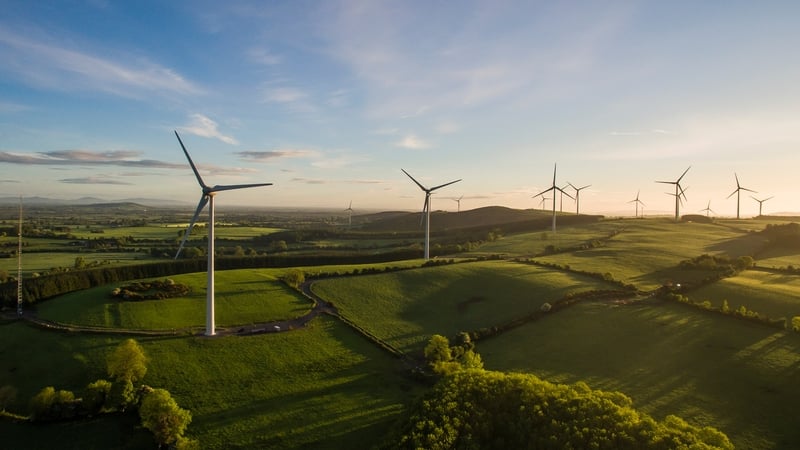
This post was originally published on this site.
Minister for Climate, Energy and the Environment, Darragh O’Brien, has welcomed the results of the latest national auction for new onshore wind and solar energy projects as part of the Renewable Electricity Support Scheme.
The outcome will see 23 major new renewable energy projects delivered over the next four years, mainly in the east, southeast and midlands of the country.
Included in that are 18 solar farms and five onshore wind developments, which, between them, will produce enough clean electricity for 357,000 homes.
That will be over 200MW of electricity from wind and 860MW from solar – a significant contribution to Ireland’s target of 80% of electricity demand to be met by renewable sources.
The outcome also underscores that solar can compete with onshore wind farms and is now Ireland’s fastest growing renewable electricity source.
Wind Energy Ireland, which represents wind farm developers, said it was delighted to see five wind projects win contracts but expressed disappointment with the size.
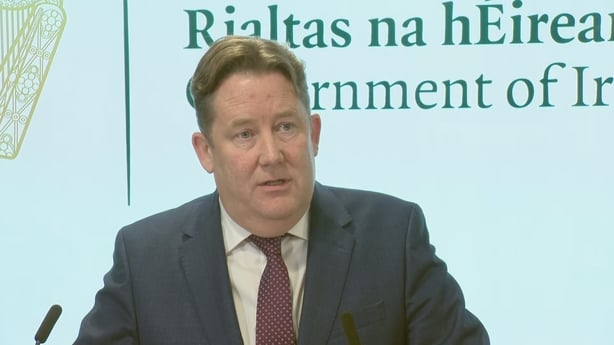
Its CEO, Noel Cunniffe said, today’s auction means more clean, affordable and secure power for Irish families and businesses.
“While we’re delighted to see five of our projects win contracts, we had hoped for a bigger auction and to see more projects get over the line.
“Our priority now is to focus on finding an alternative route to market for those unsuccessful projects while preparing for next year’s auction by working with the Government to get more wind farms out of the planning system and with secure grid connections.”
The Renewable Electricity Support Scheme operates competitive auctions where developers of wind and solar farms offering to produce and supply renewable electricity to the national electricity grid for a 15-year period at a Government supported price.
The average price achieved on this occasion is €98.81 per megawatt hour of electricity.
This is the amount successful renewable energy providers are guaranteed to be paid, even when the wholesale price of electricity falls below that level.
However, if wholesale prices are higher, the renewable electricity suppliers are required to repay money to electricity customers.
It is a two-way settlement arrangement that provides significant protection to consumers while at the same time ensuring the economic sustainability and attractiveness of the renewable energy projects for developers.
This was the fifth auction to date, and the weighted-average price settled on was similar to that achieved under the last three of these auctions.
To participate in the auction, every bidder had to have planning permissions and electricity grid connection permissions in place and be prepared for their project to be operational and providing electricity to the national grid by 31 December 2029.
On this occasion, there were 40 applicants, but only 33 qualified to make bids.
This included 10 proposed onshore wind farm projects and 23 proposed solar farms.
Out of them, five wind farms and five solar farms made unsuccessful bids.
This left 23 successful bidders, 18 of which were solar farms.
All projects will be obligated to contribute to a Community Benefit Fund.
The minimum contribution will be €2 per megawatt hour of electricity.
This should yield a total of €45 million in community benefits over the next 15 years. That will be €3 million per year of benefits for the communities in which the new renewable energy projects are located.
Minister O’Brien said the renewable energy that will flow from today’s auction will cut carbon emissions, reduce Ireland’s dependence on imported fuels, and generate investment and jobs in communities across the country.
“Accelerating and increasing the deployment of renewable electricity generation, especially onshore wind and solar, is fundamental to meeting our sectoral climate targets.
“July this year also marked a significant milestone for Ireland, as it was the first full month in which coal did not feature in our electricity fuel mix, after its use was discontinued at Moneypoint in June after 40 years.
“The deployment and connection of wind and solar energy generation at pace and at scale to our electricity grid benefits households and business by shielding them from volatile fossil fuel imports using our indigenous natural energy resources”, he said.
-
Culture1 day ago
Taylor Swift’s new cinema outing generates more than €12million in just 24 hours
-
Politics1 day ago
European Parliament snubs Orbán with vote to shield Italian MEP from Hungarian arrest
-
Culture1 day ago
Milan Fashion Week 2025: Unmissable shows and Giorgio Armani in mind
-
Culture2 days ago
Marvel stars Mark Ruffalo and Pedro Pascal stand up for Jimmy Kimmel as Disney boycott intensifies
-
Business11 hours ago
Households to be offered energy bill changes, but unlikely to lead to savings
-
Culture2 weeks ago
Life, loss, fame & family – the IFI Documentary Festival in focus
-
Travel & Lifestyle1 day ago
New York City’s Most Iconic Foods—and Where to Get Them
-
Other News1 day ago
Germany updates: Finance minister defends 2026 budget plans




